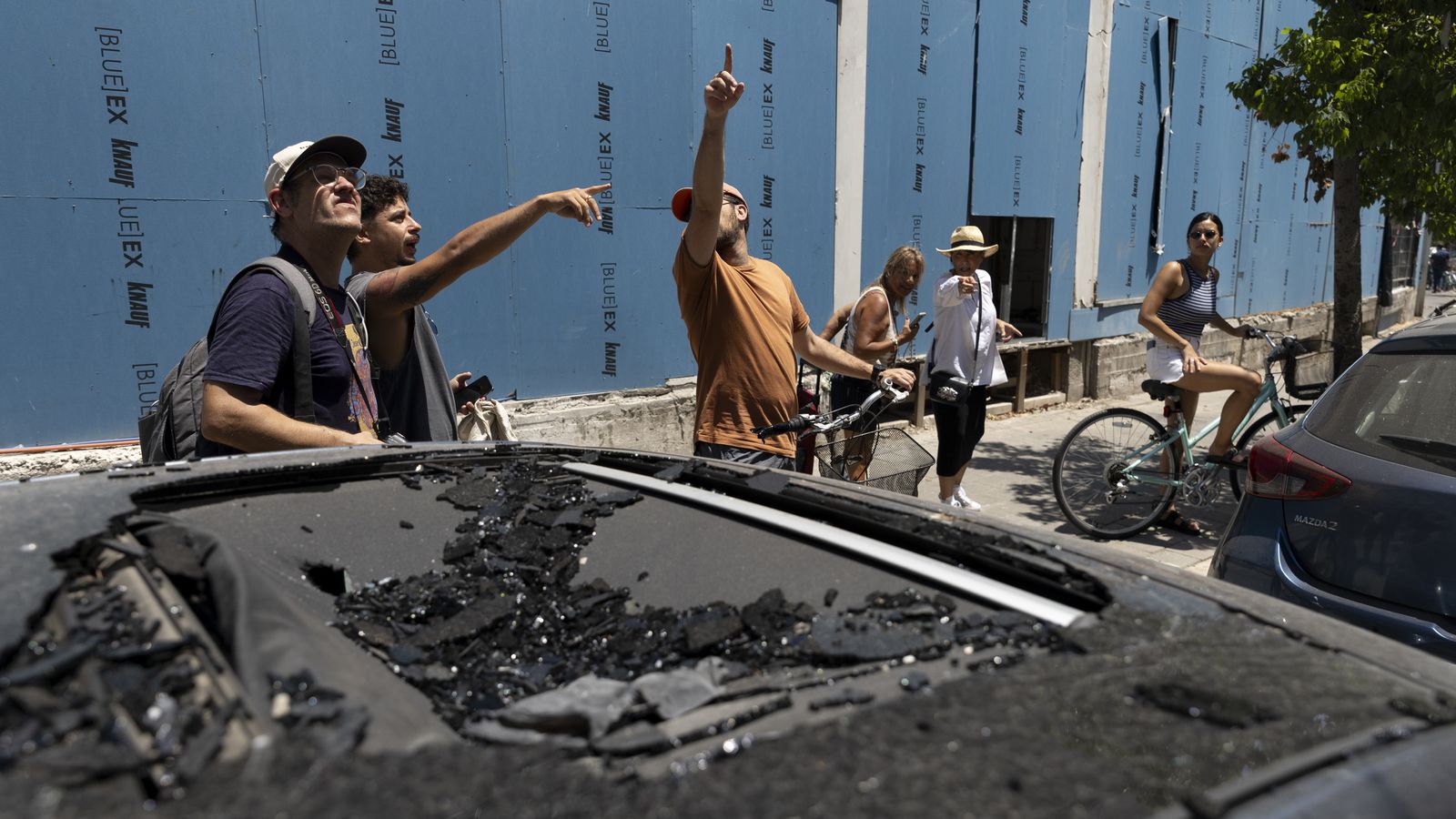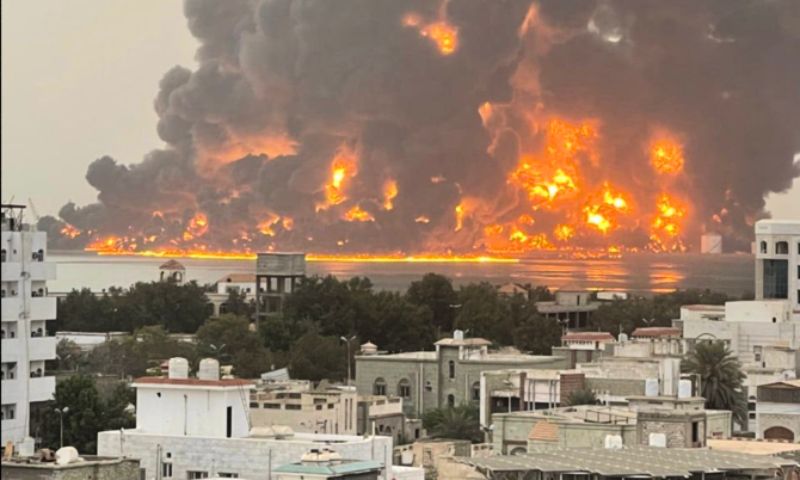The Escalating Attacks Between Israel And Houthis Can Trigger a Massive War Pushing The World On Edge, Israeli Attack Against Yemen Signals’ Dangerous’ New Phase, Hezbollah; How US Policy Has Failed Again.

On July 20, the Israeli air force attacked the Yemeni port of Hodeidah, which is controlled by the Yemeni militia Ansar Allah, also known as the Houthis.
According to local media, the attack resulted in a large explosion at a fuel storage facility and a power plant, killing at least six people. This air raid was in retaliation for a long-range drone launched from Yemeni territory that struck Tel Aviv on July 19, resulting in the death of one person.
The Houthi attack marked a significant technological and symbolic victory, as the group managed to penetrate Israeli territory, bypassing the Israeli air defense system and inflicting damage for the first time since hostilities began in October 2023.
Israel’s choice to target civilian infrastructure instead of military targets suggests that tensions in the Red Sea region may escalate into a broader conflict.
The Houthi group has claimed responsibility for the drone attack on Tel Aviv, which killed one person and injured eight. The strike is notable as it is the first time the group has hit Tel Aviv, despite their ongoing campaign against targets they associate with Israel since the war on Gaza began in October.
The drone struck central Tel Aviv early on Friday morning near several hotels hosting people displaced from Israel’s northern border with Lebanon. A US embassy office is also located close to the attack site.
“An initial inquiry indicates that the falling of an aerial target caused the explosion in Tel Aviv, and no sirens were activated.
The incident is under thorough review,” stated the Israeli military, attributing the failure to detect the drone to human error rather than a system malfunction.
Israeli army spokesman Daniel Hagari, in a video released on Friday evening, confirmed that the aircraft hit an apartment building. He identified the drone as a Samad-3, an Iranian-manufactured craft modified to extend its range. Iran has yet to comment on the attack or the Israeli allegations.
According to Houthi spokesman Yahya Saree, the aircraft was a new type of drone named “Jaffa,” capable of flying undetected through Israel’s extensive air defense systems.

How unusual is this?
Despite being just 80 km (50 miles) from Gaza, Tel Aviv has remained largely untouched by the conflict unfolding in the enclave since October. More than 38,000 Palestinians have been killed in Israel’s relentless war on Gaza.
The drone strike in Tel Aviv, the centre of much of Israel’s diplomatic functions, underlines the growing reach of the Houthi arsenal, say, analysts.
The Houthi group has extensively used drones throughout its campaign. However, almost all missiles and drones launched against Israel have been intercepted, with none previously reaching Tel Aviv.
“The Houthis have claimed many attacks on Israel before, but there’s little evidence to indicate most of those came anywhere close to hitting, certainly not causing death and injury like this one,” independent Yemen analyst Nick Brumfield told media channel.
“Notably, this is the first publicly confirmed Houthi strike in the Mediterranean rather than the Red Sea or Gulf of Aden.” Along these vital maritime routes, the Houthis have targeted numerous ships they claim have links to Israel.
Additionally, “they’ve been claiming strikes on Haifa in cooperation with Iran-backed groups in Iraq, but until now, those mostly seemed like grandstanding,” said Brumfield. “This is big.”
Is this a new thing?
Not really. The Houthis have extensively used drone warfare, including both aerial and water-bound craft, for some time.
Houthi drones have also been frequent targets for Western strikes, with the United Kingdom, France, and the United States military all reporting the destruction of unmanned targets ahead of their possible hostile use.
“I believe last night’s attack is part of the Houthi continuous escalation,” said Maysaa Shuja al-Deen of the Yemen-based Sana’a Center for Strategic Studies, suggesting that repeat incidents of Houthi drones reaching distant targets will become more common. “What’s interesting is the target and the long-range,” she added.
The Houthi movement, known formally as Ansar Allah, stated on Sunday that it would continue to attack Israel in response.

Are the Houthis Really an Iranian ‘Proxy’ Force?
The Houthis are known to be allied with Iran, but this does not necessarily mean that Tehran ordered the recent drone strike.
While it is clear that Iran supports the Houthis with weapons and components, the extent of Tehran’s control over a group that has demonstrated a high degree of unpredictability remains uncertain.
“Iran has long employed a strategy of enabling non-state allies to develop their own missile capabilities. There are strong indications that the Houthis likely have domestic production capabilities as well,” said Fabian Hinz of the International Institute for Strategic Studies.
Israel’s Response
On July 20, Israeli warplanes conducted an air raid on Hodeidah, Yemen, resulting in six fatalities and over 80 injuries, according to medical sources in Yemen, all of whom were civilians. This attack, targeting oil storage facilities and a power station, marked Israel’s first direct response to recent Houthi strikes.
Hezbollah described the Israeli air raid on Hodeidah as “reckless” and a signal of a “new and dangerous phase” in regional confrontation.
The Lebanese group condemned the Israeli aggression as part of a broader American-British campaign against Yemen and reaffirmed its support for the Yemeni people and their resistance alongside Palestine.
Fears are mounting of a broader regional conflict, particularly involving Israel and Hezbollah, amid ongoing cross-border attacks.
Meanwhile, Iran condemned the Israeli attack on Yemen’s Hodeida port, with foreign ministry spokesperson Nasser Kanani denouncing it as indicative of “the aggressive behavior of the child-killing Israeli regime.”
Kanani also blamed Israel and its allies, including the United States, for the dangerous consequences of the ongoing violence in Gaza and the attacks on Yemen.

Regional Tensions and US Foreign Policy
The escalating tensions since the onset of the Israel-Hamas war in October have drawn in Iran-backed militant groups across Syria, Lebanon, Iraq, and Yemen.
The Houthis, along with Hezbollah and Hamas, form part of a Tehran-aligned “axis of resistance” against Israel and its allies. While Iran continues to support these groups, it insists on their autonomy in decision-making and actions.
The recent developments emphasise not only the failure of the United States’ bombing campaign to deter the Houthis but also its struggle to prevent a broader regional conflict—a top diplomatic priority since October 2023.
A Houthi Victory
The Houthi attack on Israel on July 19 marked the nine-month anniversary of their intervention alongside Hamas and other Palestinian resistance groups against Israeli forces.
On October 19, the Houthis had previously launched a series of missiles and drones towards Israeli territory, demanding an end to the Israeli invasion of Gaza.
Although Israel’s Arrow missile defense system intercepted these projectiles, the Houthis soon expanded their attacks to include ships they believed were linked to Israel or its allies, disrupting one of the world’s busiest shipping lanes.
In December, the US and its Western allies initiated a Red Sea operation aimed at stopping attacks on ships from Yemeni territory and securing shipping routes. However, this campaign largely failed to achieve its objectives.
Houthi attacks have continued unabated.
On January 10, the group launched 18 drones, two anti-ship cruise missiles, and an anti-ship ballistic missile—all intercepted by US and British forces. Allied forces retaliated with air strikes on Houthi military targets in Yemen.
Despite this, attacks on shipping lanes persisted, causing damage and losses to several vessels.
Houthi missiles also continued targeting Israel, with a cruise missile penetrating Israeli air defenses and exploding near the port of Eilat in mid-March.
In April, the Houthis joined Iran in a missile and drone attack on Israel in response to the assassination of Iranian officials in Syria.
The Houthi drone strike deep into Israeli territory on July 19 is viewed in Sanaa as a symbolic victory, even amidst Israel’s severe retaliation.
Such military successes are enhancing the group’s profile both domestically and regionally, broadening their appeal beyond their Zaidi Shia base and boosting their international legitimacy.

US Failures
While there may be a sense of triumph in Sanaa, Washington faces significant setbacks.
The seven-month-long US-led campaign against the Houthis has yielded few results and incurred substantial costs.
Since January 2024, the US has launched numerous missile strikes against Houthi targets, with each missile costing between $1 million and $4.3 million.
These expensive attacks prompted Senator Jack Reed, Chairman of the US Senate Armed Services Committee, to caution President Joe Biden in January, questioning the sustainability of such costly measures: “So you’ve got this issue that will be emerging of how long can we continue to fire expensive missiles.”
Additionally, the US has lost at least three Reaper drones over Yemen, each valued at $30 million. The total cost of the operation is estimated to range between $260 million and $573 million per month, amounting to between $1.8 billion and $4 billion so far.
Despite these efforts, neither the US nor its allies have managed to halt the disruption of shipping lanes, leading to soaring shipping and insurance costs.
President Biden has acknowledged the ineffectiveness of the strikes against the Houthis but has resisted halting them, even as experts suggest that “strategic inaction” might be a more effective approach.
He has also avoided pressuring Israel to address the ongoing crisis in Gaza, despite the Houthis’ clear stance that their attacks would cease with a ceasefire.
Instead, the Biden administration has permitted Israel to commit severe atrocities in Gaza, violating established legal and ethical norms. This policy has also enabled Israel to escalate conflicts not only with the Houthis but also with Hezbollah in Lebanon and Iran.
The administration’s actions, or lack thereof, have failed to prevent a potential regional war, contradicting its stated objective to avoid such an escalation.
As President Biden has decided not to seek re-election, he will be remembered as the US president who exacerbated one of the most severe crises in recent Middle Eastern history and one that has the world on the edge as neither Israel nor Houthis want to backdown.




